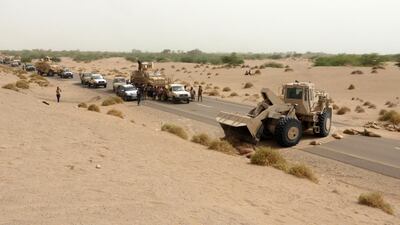For all the criticism the Arab Coalition's military operation to liberate the Yemeni port city of Hodeidah has attracted from some quarters in the West, the offensive is vital if this war-ravaged country is to stand any chance of ending its three-year conflict.
Thousands of troops, backed by Saudi and Emirati forces, have now launched what is undoubtedly the largest offensive undertaken during the course of the conflict in an effort to recapture the port on behalf of Yemen’s internationally-recognised government.
The two-pronged assault has involved columns of jeeps and armoured vehicles filled with coalition-trained Yemeni forces advancing from points 15 miles south and southeast of the port city. This has been accompanied by a second amphibious assault from the sea, with Saudi ships carrying troops trained in Eritrea across the Red Sea to land at locations to the southwest of the city.
At the same time coalition aircraft have launched operations to attack Iranian-backed Houthi positions around the city.
From the moment, though, that coalition commanders announced they were launching operation Golden Victory, the codename for the military offensive to liberate Hodeidah from Iranian-backed Houthi rebels, there has been a well-orchestrated outcry claiming that the offensive will plunge the country into an even greater humanitarian crisis.
At present international aid groups claim that the war in Yemen is now the world's worst humanitarian crisis. United Nations secretary general Antonio Guterres recently warned that more than 22 million people – three-quarters of the population – were in desperate need of aid and protection.
But the crucial fact that Mr Guterres and other aid organisations consistently appear to overlook in their damning assessments of the Yemen conflict, which often lay the blame at the door of the Saudi-led coalition, is the role the Houthi rebels have played in creating this humanitarian disaster, particularly through their control of Hodeidah.
Ever since the Houthis seized the port, the rebels have imposed a stranglehold over all goods entering the country, leaving them in control of the distribution of vital food and aid. The Houthis have managed to finance themselves through looting, extortion and imposing illegal taxation on commercial ships – including those carrying humanitarian aid.
And it is the Houthis’ failure to ensure an equitable distribution of this aid that has contributed significantly to the mass starvation now affecting large areas of the country. At the same time their failure to distribute medical supplies has been a significant contributory factor in the country suffering the worst cholera outbreak in history.
_______________________
Read more from Opinion:
Alan Philps: Can showmanship and chemistry really advance the cause of a US-North Korean peace?
HA Hellyer: A tale of two countries gives opposing views of Islam in Europe
_______________________
But rather than holding the Houthis and their Iranian backers to account for their role in bringing Yemen to its knees, the more common narrative emanating from aid workers is that this humanitarian tragedy is solely the responsibility of the Arab Coalition and their Western backers, such as Britain and the US.
The other troubling issue – one that precipitated the coalition's decision to liberate Hodeidah – is that the port is increasingly being used to import a variety of Iranian weapons, including sophisticated missiles and drones. Apart from being used in the fight against pro-government forces in Yemen, these weapons are increasingly being used to launch attacks across the Yemeni border against Saudi Arabia. Saudi security officials estimate that the Houthis have launched 150 attacks on the Kingdom with advanced ballistic missiles, while more recently there has been an upsurge in attempts by the Houthis to launch drone attacks.
The Houthis’ increasingly aggressive conduct with regard to deploying the arms shipments they receive from Iran on a regular basis also has potential implications for the rest of world.
An estimated 15 per cent of global commerce passes through the region, and the Houthis now pose a very real threat to the security of international shipping lanes, especially the area stretching from the Bab Al Mandab strait to the Red Sea approach to the Suez Canal.
This sharp escalation in the military threat posed by the Houthis and their Iranian backers has been one of the main factors behind the coalition's decision to reclaim control of Hodeidah.
Another important element has been the obstructive tactics the Houthis have adopted to thwart any hope of finding a diplomatic solution to the crisis. For example, a mediation plan proposed by the coalition, whereby the port would be placed under international supervision under the auspices of the UN, and which had the backing of Yemen’s democratically-elected government, was rejected out-of-hand by the Houthis.
The prospect of Yemen being plunged into an even deeper humanitarian disaster effectively left the coalition with no alternative but to act. Contrary to the claims being made by some that the coalition action will only cause more misery, the coalition insists the best way to bring Yemen's appalling civil war to an end is to take decisive action to break the Houthis' stranglehold over vital locations such as Hodeidah.
The coalition’s strategy has been succinctly summed up by Dr Anwar Gargash, the UAE’s Minister of State for Foreign Affairs. “Once Hodeidah is returned to government control it will help to break the impasse that has frozen Yemen’s progress over the last three years, by finally forcing the Houthis to come to the negotiating table in good faith, so that the country can move forward.”
The aim of the coalition’s offensive, therefore, is to end Yemen’s suffering, not to prolong it, an objective that is now probably the only practical solution to resolving this dreadful conflict.
Con Coughlin is the Daily Telegraph’s defence and foreign affairs editor


